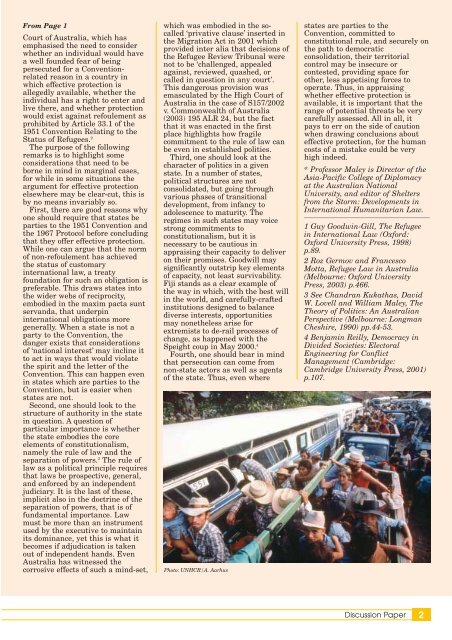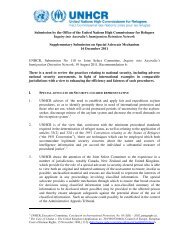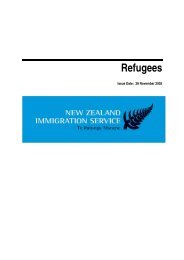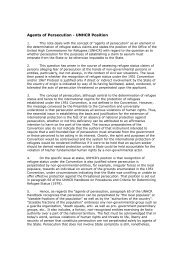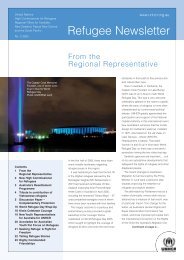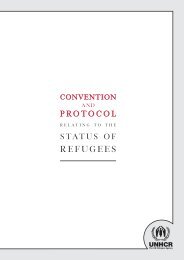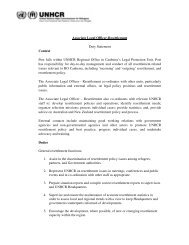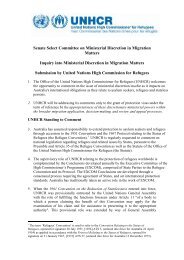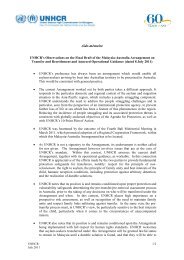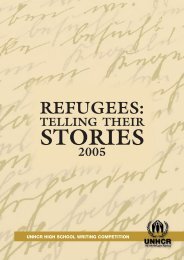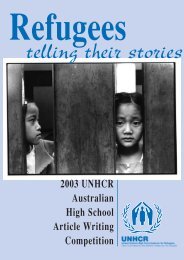download newsletter - unhcr
download newsletter - unhcr
download newsletter - unhcr
You also want an ePaper? Increase the reach of your titles
YUMPU automatically turns print PDFs into web optimized ePapers that Google loves.
From Page 1<br />
Court of Australia, which has<br />
emphasised the need to consider<br />
whether an individual would have<br />
a well founded fear of being<br />
persecuted for a Conventionrelated<br />
reason in a country in<br />
which effective protection is<br />
allegedly available, whether the<br />
individual has a right to enter and<br />
live there, and whether protection<br />
would exist against refoulement as<br />
prohibited by Article 33.1 of the<br />
1951 Convention Relating to the<br />
Status of Refugees. 2<br />
The purpose of the following<br />
remarks is to highlight some<br />
considerations that need to be<br />
borne in mind in marginal cases,<br />
for while in some situations the<br />
argument for effective protection<br />
elsewhere may be clear-cut, this is<br />
by no means invariably so.<br />
First, there are good reasons why<br />
one should require that states be<br />
parties to the 1951 Convention and<br />
the 1967 Protocol before concluding<br />
that they offer effective protection.<br />
While one can argue that the norm<br />
of non-refoulement has achieved<br />
the status of customary<br />
international law, a treaty<br />
foundation for such an obligation is<br />
preferable. This draws states into<br />
the wider webs of reciprocity,<br />
embodied in the maxim pacta sunt<br />
servanda, that underpin<br />
international obligations more<br />
generally. When a state is not a<br />
party to the Convention, the<br />
danger exists that considerations<br />
of ‘national interest’ may incline it<br />
to act in ways that would violate<br />
the spirit and the letter of the<br />
Convention. This can happen even<br />
in states which are parties to the<br />
Convention, but is easier when<br />
states are not.<br />
Second, one should look to the<br />
structure of authority in the state<br />
in question. A question of<br />
particular importance is whether<br />
the state embodies the core<br />
elements of constitutionalism,<br />
namely the rule of law and the<br />
separation of powers. 3 The rule of<br />
law as a political principle requires<br />
that laws be prospective, general,<br />
and enforced by an independent<br />
judiciary. It is the last of these,<br />
implicit also in the doctrine of the<br />
separation of powers, that is of<br />
fundamental importance. Law<br />
must be more than an instrument<br />
used by the executive to maintain<br />
its dominance, yet this is what it<br />
becomes if adjudication is taken<br />
out of independent hands. Even<br />
Australia has witnessed the<br />
corrosive effects of such a mind-set,<br />
which was embodied in the socalled<br />
‘privative clause’ inserted in<br />
the Migration Act in 2001 which<br />
provided inter alia that decisions of<br />
the Refugee Review Tribunal were<br />
not to be ‘challenged, appealed<br />
against, reviewed, quashed, or<br />
called in question in any court’.<br />
This dangerous provision was<br />
emasculated by the High Court of<br />
Australia in the case of S157/2002<br />
v. Commonwealth of Australia<br />
(2003) 195 ALR 24, but the fact<br />
that it was enacted in the first<br />
place highlights how fragile<br />
commitment to the rule of law can<br />
be even in established polities.<br />
Third, one should look at the<br />
character of politics in a given<br />
state. In a number of states,<br />
political structures are not<br />
consolidated, but going through<br />
various phases of transitional<br />
development, from infancy to<br />
adolescence to maturity. The<br />
regimes in such states may voice<br />
strong commitments to<br />
constitutionalism, but it is<br />
necessary to be cautious in<br />
appraising their capacity to deliver<br />
on their promises. Goodwill may<br />
significantly outstrip key elements<br />
of capacity, not least survivability.<br />
Fiji stands as a clear example of<br />
the way in which, with the best will<br />
in the world, and carefully-crafted<br />
institutions designed to balance<br />
diverse interests, opportunities<br />
may nonetheless arise for<br />
extremists to de-rail processes of<br />
change, as happened with the<br />
Speight coup in May 2000. 4<br />
Fourth, one should bear in mind<br />
that persecution can come from<br />
non-state actors as well as agents<br />
of the state. Thus, even where<br />
Photo: UNHCR/A. Aarhus<br />
states are parties to the<br />
Convention, committed to<br />
constitutional rule, and securely on<br />
the path to democratic<br />
consolidation, their territorial<br />
control may be insecure or<br />
contested, providing space for<br />
other, less appetising forces to<br />
operate. Thus, in appraising<br />
whether effective protection is<br />
available, it is important that the<br />
range of potential threats be very<br />
carefully assessed. All in all, it<br />
pays to err on the side of caution<br />
when drawing conclusions about<br />
effective protection, for the human<br />
costs of a mistake could be very<br />
high indeed.<br />
* Professor Maley is Director of the<br />
Asia-Pacific College of Diplomacy<br />
at the Australian National<br />
University, and editor of Shelters<br />
from the Storm: Developments in<br />
International Humanitarian Law.<br />
1 Guy Goodwin-Gill, The Refugee<br />
in International Law (Oxford:<br />
Oxford University Press, 1998)<br />
p.89.<br />
2 Roz Germov and Francesco<br />
Motta, Refugee Law in Australia<br />
(Melbourne: Oxford University<br />
Press, 2003) p.466.<br />
3 See Chandran Kukathas, David<br />
W. Lovell and William Maley, The<br />
Theory of Politics: An Australian<br />
Perspective (Melbourne: Longman<br />
Cheshire, 1990) pp.44-53.<br />
4 Benjamin Reilly, Democracy in<br />
Divided Societies: Electoral<br />
Engineering for Conflict<br />
Management (Cambridge:<br />
Cambridge University Press, 2001)<br />
p.107.<br />
Discussion Paper<br />
2


